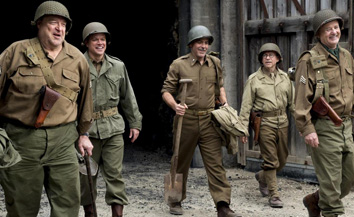Movie Review: The Monuments Men
By Matthew Huntley
February 13, 2014
BoxOfficeProphets.com

It seems fitting that George Clooney of all people would want to make this movie. The outspoken actor-filmmaker is known for his liberalism and patriotism, both in and outside of Hollywood. But he’s also recognized for his artistic passions, and wouldn’t you know, his character in The Monuments Men, Lieutenant Frank Stokes, is a nationalist with a deep appreciation for the arts and culture — so much, in fact, that he beseeches the President of the United States himself, Franklin Delano Roosevelt, to sanction a mission that would save Europe’s most treasured pieces of art from the Nazis. Stokes firmly believes if Hitler and his regime were allowed to keep or destroy the thousands of paintings, sculptures and statues crafted by some of the world’s finest artisans, an entire people's way of life and legacy would be lost, which is tantamount to people dying.
But with the German stronghold on Europe waning, and the war nearing its end (the story opens in 1943), the president is hesitant to grant Stokes his request. He’s not too keen on using America’s current military resources to save art, but he does allow Stokes to form his own team to carry out the task. Deemed The Monuments Men, their job is to infiltrate cities like Bruges, Paris and Milan to hopefully find and salvage its stolen art, lest it be burned or taken to Hitler’s planned Führer museum.
Just as Clooney’s Danny Ocean recruited a team of specialists in Ocean’s 11 to knock off a casino, Stokes gathers up his cohorts and former fellow soldiers to steal art back from the Nazis. The colorful and over-40 group includes James Granger (Matt Damon), curator for the MET in New York City; Chicago architect Richard Campbell (Bill Murray); sculptor Walter Garfield (John Goodman); French painter Jean Claude Clermont (Jean Dujardin); ballet director Preston Savitz (Bob Balaban); and British army major Donald Jeffries (Hugh Bonneville), whose years of drinking have left him feeling disgraced and he’s grateful for the chance to restore his dignity.
Two other notable characters are a German-American from New Jersey named Sam Epstein (Dimitri Leonidas), who turns out to be a crucial asset; and Claire Simone (Cate Blanchett), who worked as a secretary to a German SS officer. After receiving devastating news about her family, she has a personal stake in seeing the Nazis fall.
After barely completing basic training, Stokes and his men branch off to various cities and keep in touch via radio. They’re given little support from other military officers, who, like members of the White House, aren’t convinced art is worth risking lives for, a question that becomes the film’s running theme.
Once its straightforward plot is in motion, The Monuments Men more or less unfolds out the way we expect. Clooney plays it safe in terms of executing the story, opting for broad humor and pathos over violence and politics. He doesn’t overcomplicate things and instead embraces conventional motifs involving honor, sacrifice and the indispensable role art plays in the world.
Though bold and daring The Monuments Men is not, it’s still well made and entertaining. Based on Robert M. Edsel’s book, The Monuments Men: Allied Heroes, Nazi Thieves and the Greatest Treasure Hunt in History, it recounts an important, real-life story that might have otherwise gone unnoticed, and we appreciate it for that. Plus, the cast is undeniably charming; they’re able to disguise the film’s rather vanilla and uninspired approach to the material.
If Clooney’s goal was to simply bring this subject to light and not instigate debate, then he accomplished his mission. Yes, given the caliber of talent involved, and the underlying topic, The Monuments Men probably had the potential to be greater and more compelling than it is, but as it is, it’s rhythmic, engaging and, to a degree, educational. Call it a casual history lesson instead of an in-depth one, but a history lesson nonetheless.